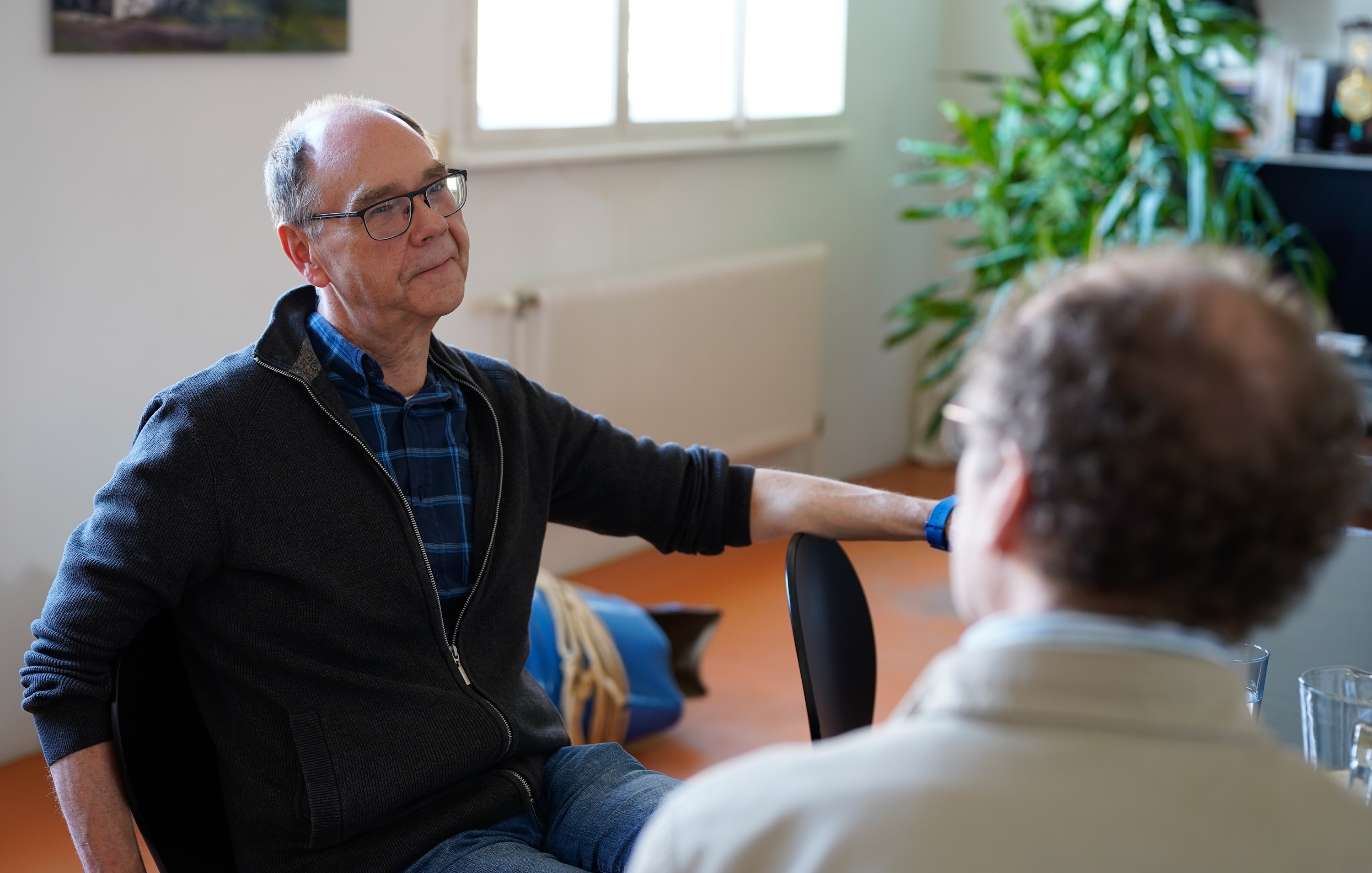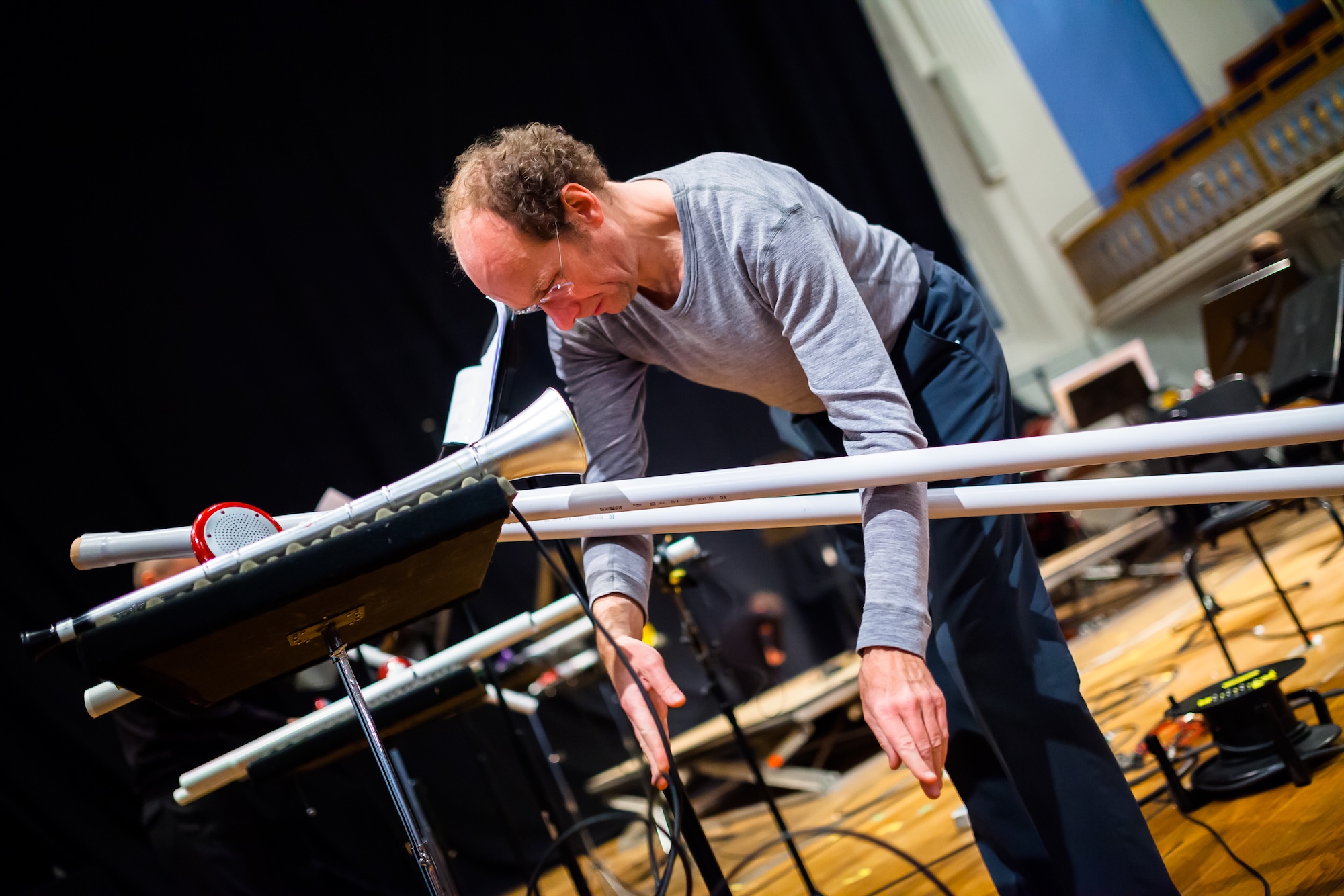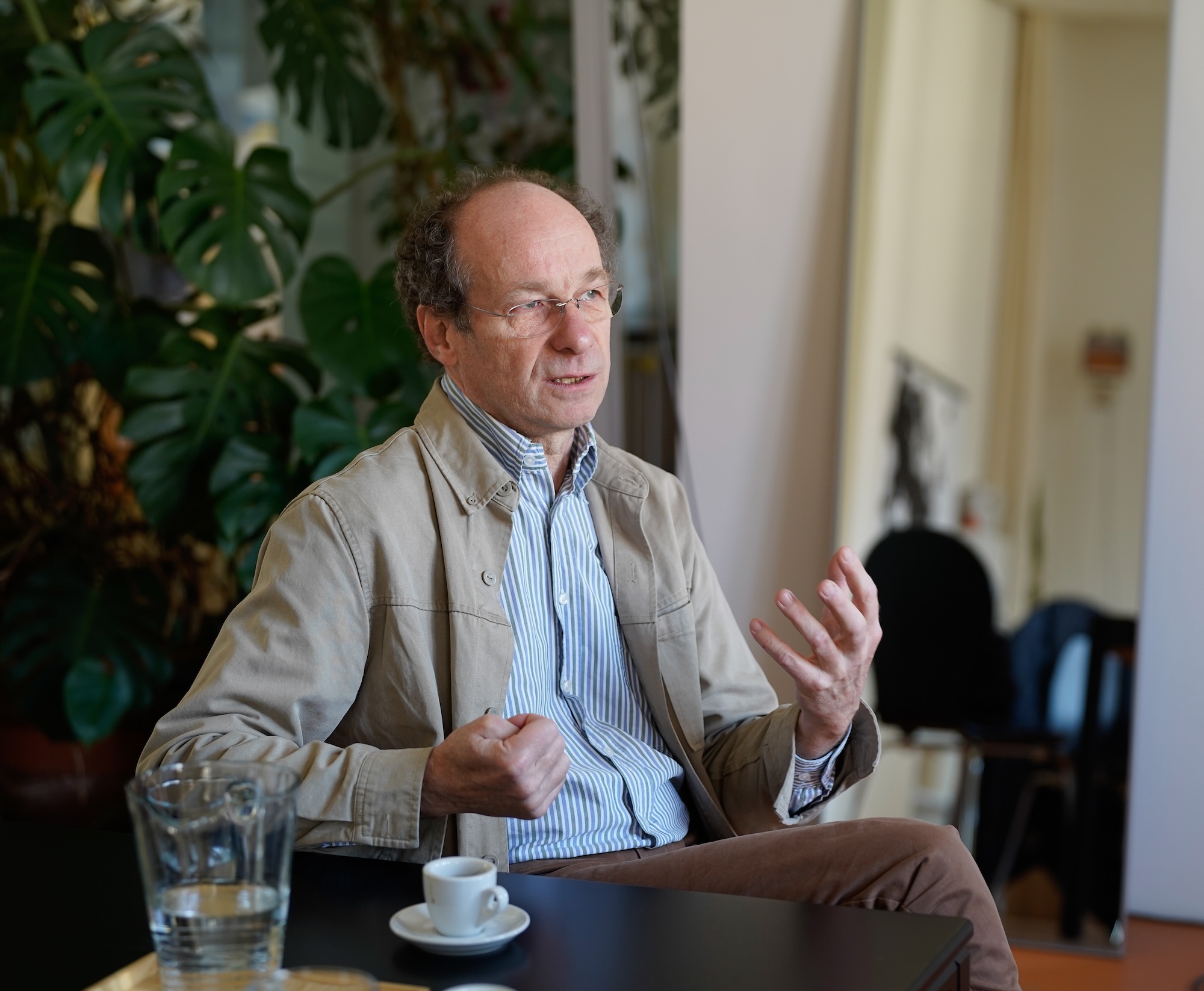Benedikt Leitner: When was your first concert with Klangforum Wien?
Peter Böhm: That was at the Secession in Vienna, with Carol Morgan, I think.
BL: That was the Klangforum pianist back then, exactly. Was that before 1989?
PB: Yes, I think that was back in 1987, when I was already involved and even borrowed a system.
BL: But were you interested in New Music, or was it a chance contact with Beat Furrer, for example? What brought you to new music?
PB: I studied violin and jazz theory and taught George Russell's Lydian Chromatic Concept with Robert Weiß in Wiener Neustadt. So I've always been very interested in different styles of music, also technically, but overall, music for me always has to be heading towards something new. I'm a huge fan of Edgar Varèse and other recordings of new music.
BL: So that was your passion?
PB: Absolutely. I didn't really want to do anything that would end in a kind of repetition.
BL: You also played with Roland Neuwirth, didn't you?
PB: Yes, exactly. That was also very exciting. We played on all sorts of different occasions.
BL: Okay, so that was your start, so to speak. In other words, you were there from the very beginning. And if we look back now - if you could choose two or three highlights from these 40 years, which projects would they be?
PB: Oh, that's very difficult.(thinking) There really were so many that were super interesting. But perhaps one of the greatest projects I can remember is Construction in Space by Olga Neuwirth. Her works were extremely elaborate for the time. Many things were at the limits of what was feasible, it wasn't like today, it wasn't taken for granted. I started out at a time when there weren't even laptops or computers.
BL: But that was live electronics, wasn't it?
PB: These were granular samples, which then form different surfaces.
BL: And four soloists.
PB: Yes, four soloists. And I think 15 loudspeakers. And what I've always really enjoyed doing are Luigi Nono pieces.
BL: I already thought that would happen. (Laughs)
PB: Well, starting with À Pierre, for example.
BL: À Pierre was an incredibly important performance for Klangforum Wien, one of the first concerts at the Salzburg Festival.
PB: Exactly, and back then I borrowed three or four analog devices to be able to do these long delays at all - there were no electronics. I actually always loved being on my own, collecting the information and then working on the piece, preparing it.

BL: Do you remember Der Wald, the opera by Olga Neuwirth? With the text by Elfriede Jelinek, together with Sarah Barrett? She did the squeaky door, she imitated it incredibly well. Nowadays you would probably start a sample. And that's a good example of how things like that have accelerated rapidly over the last 40 years. Today, almost every composer has access to this technology, everyone can prefabricate a piece at home?
PB: I think it's also important that the tools are freely available. I find it much more interesting when almost everyone has access to the tools, so to speak. That's actually a social aspect behind it, which has always interested me. For example, the non-orchestral grouping at Klangforum Wien. There is no strict administrative apparatus, but rather individuals who want to create something together. And that really fascinated me in the 90s, the independence of the people, the commitment of all of us. I always saw myself as a kind of member, but never aspired to membership or anything like that. I always thought, to use the term "wild marriage" - if you want to be together, then that's what happens.
BL: You also wanted to fill this freedom yourself?
PB: Exactly. And that makes it possible for everyone to work well together, to be together. That also worked perfectly for me.
BL: We are also infinitely grateful to you, that has to be said. All this work at the very beginning, everything was a bit raw and not yet so well structured, but we were curious, weren't we? And I remember we once played the piece by Beat Furrer -
PB: Exactly, Beat was certainly a very important factor in why I got into music in the first place. I was always very fascinated by his meticulousness in developing something new, in choosing a language that is not so pleasing, and which reminded me very much of various aspects of 20th century music. These ideas of clouds and swarms. Some of his pieces are constructed in a similar way to small particles and only then result in something whole, in the truest sense of the word. He often asked me whether it was possible to amplify some very small sound, whether it would be heard. Of course I was very grateful, because I thought to myself, ah, I can do that. What always interested me about the electronic process was that you can control something manually, that you can influence it, right? Compared to today, where thousands of parameters are pre-stored and then only called up at the touch of a button in a concert, I've actually lost a bit of this spirit of creativity. I've always seen it as an instrument and not as a machine.
BL: Yes, and of course we've always had a lot of trust. The position of sound director has to be seen in the same way as that of an instrumentalist, I certainly always saw it that way, and you have to make a lot of decisions, don't you? We were 15 people back then, and that can be complicated, as you know. If one person says it's always too loud and the other says it's always too quiet and I'd like to hear it and, and, and. Hopefully that was also an interesting source of friction for you, but probably not always very pleasant either, was it? When A and B and C come in and all three say three different things, you're sitting there at that moment and have to balance it all out.

PB: Yes, I think I've always been able to balance it out quite well when different demands come crashing in on me. "Pelting in" is perhaps the better word, because it usually comes completely unfiltered in the rehearsal process and you have to deal with it and find a middle ground.
BL: And then there's another factor, because there are also people in the audience at the concert, who change it again, and that's incredibly complex for us sitting on stage. Most of the time the speakers are at the front, so we don't always hear everything in its entirety. So it always remains a gray area and a matter of trust.
PB: It's almost like atomic physics, isn't it, so you change the result again through observation.
BL: I also find it interesting that, in my experience, the ear also gets used to sounds. In other words, it's different when I go into a room at 8:30 a.m. and listen to something than when I've been playing for half an hour and have heard something. So it's complex, in any case.
PB: The acoustics are generally very complicated because, as Alvin Lucier said, there are very different positions within the room. This means that every seat, every position in the room hears differently, of course, and you can't serve everything optimally to everyone.
BL: Yes, the last decision, the final decision during the concert, is a very important and big one.
PB: And it's not just a question of concerts, but also of feasibility, isn't it? If you have to set up the evening before and the dress rehearsal is the next day, then you can't spend hours testing.
BL: No, the schedule is tight.
PB: Exactly. And unfortunately, I think that has become much shorter, these periods of time for a concert have become smaller and smaller or tighter - or more structured is perhaps a better word. And I don't think you have the chance to reflect at all anymore, like going out for an hour and listening to it again afterwards.

BL: Yes, that has to work. But isn't that also a reason why composers are attempting more and more complex stories? That they simply have all the tools, so to speak, and they know a lot and...
PB: Well, I don't think so, to be honest. Firstly, technical complexity - that is, what can be controlled and so on - is not necessarily linear to what I would understand by complexity. For me, complexity is when the compositional ideas are on the edge of feasibility, so to speak, or exploring something new that you have to go back to, right? It's not the yellow and red markings of a hiking trail that is asphalted, but you have to somehow look at every step, how do I climb the root or go through the wet and so on. And these are often micro-decisions that have a major impact on the whole thing. And I wouldn't say that more complex electronic pieces are being created these days. I think they are just different. It's a different relationship to technology and electronics or to the task: why do you need it at all? So the vision of the last century that everything acoustic would be replaced by electro-acoustic media at some point is no longer there as a vision, I think - and in my opinion it's really a bit questionable.
BL: People also listen a lot with headphones, don't they?
PB: Yes, there's also the fact that we live in a world in which 27 acoustic spaces are created for everyone, for example in the subway, through headphones. So, you no longer perceive the room as something important, acoustically important.
BL: Yes, but we can still maintain the dream, so to speak, and that's what we try to do with our concerts, at least to create the optimum for the moment.
PB: I think that's very important. I can remember, for example, that I always listened to Janáček's Sinfonietta on record, and then at the age of 14 I experienced a live performance in Vienna and was amazed at how gigantic this spatial experience, the sound colors, this three-dimensionality simply seemed. And that's exactly where I think we're living in a "false world" today, in quotation marks, because so much is listened to on tapes and on some kind of media, even if it's just small speakers on a laptop. You can't present low-frequency things, for example, and I don't know where the future is going.
BL: You also were the recording manager with many of our recordings, for example at Casino Zögernitz.
PB: Yes, and with the Zender recordings, for example. We recorded that here(note: at Diehlgasse). Originally there was the idea that you should also be able to record in the rehearsal room, but I don't think that's so important today because it seems the production of recordings is no longer so important.
BL: You also worked on the redesign of our rehearsal room and advised us on the acoustics?
PB: Yes, for example with the acoustic shielding and the doors so that you can't hear the street noise.
BL: Exactly... Well... those were our 40 years, so to speak - or at least parts of them.
PB: Yes, looking back, I would do it again.(Laughs)
BL: It's great that we know each other. And those were wild times. And everything is moving on, now we have to hand it over to the younger generation.
PB: Yes, I'm very excited. So, I think this is a great opportunity to always keep the door open for something that can and could happen and to give these things space, because that's all you can do. And in this context, I really want to thank everyone who was there and who took part in this process. It really was a very important time for me.

Interview photos: (c) Christina Kastner/Klangforum Wien



